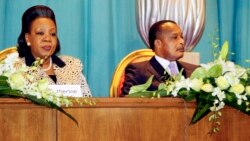Armed groups in the Central African Republic have signed a ceasefire agreement aimed at ending more than 18 months of violence that displaced over a million people and killed more than 1,000. A hundred thousand migrants from neighboring countries have also been forced out of the country by the violence.
The agreement, signed in Congo-Brazzaville on July 23, sets the stage for further negotiations on disarmament and the nation’s political future. It’s a hopeful sign of an end to the turmoil.
Violence has gripped the C.A.R. since December 2012, when the Seleka armed group, an alliance of largely Muslim rebels, began a rebellion that overthrew former President Francoise Bozize and seized power. Their horrific abuses prompted creation of largely Christian militias, the anti-balaka, and led to increasingly inter-communal violence. Since then, sectarian attacks by each group against the other, and against innocent civilians, have devastated the country despite efforts of troops from the African Union, France and the European Union.
As the appointed mediator for the transitional agreements that followed Seleka’s seizure of power, Congolese President Denis Sassou Nguesso called together representatives of the militias, as well as officials of C.A.R’s transitional government and representatives of the country’s civil society and religious and business communities. The aim was to seek a ceasefire agreement and, eventually, a national reconciliation process. After three days of talks, a deal was struck.
The United States has been deeply engaged to help end the crisis, and we welcome the cessation of hostilities agreement. It’s an important step toward ending the bloodshed and preparing the way for a peaceful, inclusive and democratic transition to legitimate, elected government – one that should focus on economic development and job creation for people in all regions of the C.A.R.
The ceasefire is only one step, however, and we strongly urge all parties to fully implement its terms and move quickly to hold and conclude further talks on the political way forward. We urge President Samba Panza and the C.A.R. Transitional Government, with help from international partners, to seize the opportunity for a political process and provide accountability for serious human rights abuses and violations of international humanitarian law. A broad-based, inclusive dialogue is also needed to encourage reconciliation following such traumatic communal conflict. All of the Central African Republic’s people should have the opportunity to have their voices heard.






